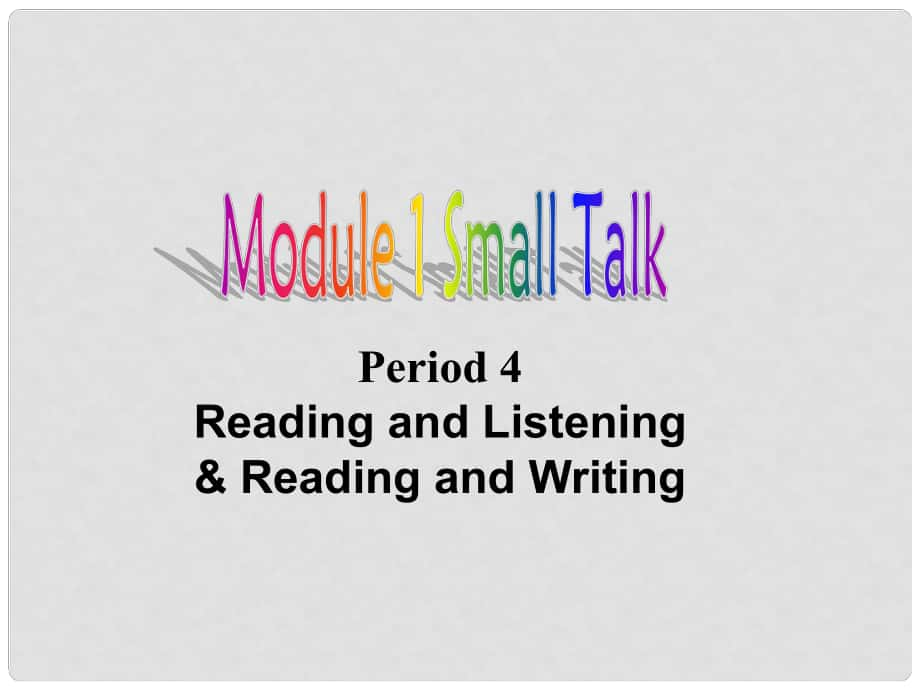《四川省宣漢縣第二中學(xué)高中英語 Module 1 Small talk Period 4課件 新人教版選修6》由會(huì)員分享���,可在線閱讀��,更多相關(guān)《四川省宣漢縣第二中學(xué)高中英語 Module 1 Small talk Period 4課件 新人教版選修6(20頁珍藏版)》請?jiān)谘b配圖網(wǎng)上搜索����。
1���、Period 4Reading and Listening & Reading and WritingListening & SpeakingRead and match the conversations with the places.at a summer schoolduring a job interviewin a business meetingon a boat1. A: Wonderful, arent they? B: Er Im sorry? A: The cliffs. B: Oh, yes, they are. A: Been here before? B: Pard
2���、on?on a boat2. A: So you wrote in your application form that you are interested in mountains. B: Yes. A: Have you ever climbed a mountain? B: No. A: Have you ever read any books about mountain-climbing? B: No.during a job interview3. A: When did you arrive? B: Yesterday A: Nice journey? B: Very nice
3���、. A: Did the immigration people ask to see your visa? B: I didnt need to get a visa. A: Really? Why not? B: Because I was born here. A: Oh yes, of course! At a summer schoolAnswer the questions about the conversations.1. Do you think the conversations are between people who know each other? Give rea
4、sons for your answers.No, they arent. In Conversation 1 “Been here before?” indicates they are strangers.The second conversation is an interview between strangers.In the third conversation, Speaker A obviously knows something about Speaker B, but probably doesnt know him very much.2. Which of the co
5���、nversations would you call small talk?conversation 1 and possibly conversation 3.3. What do you think about the answers in the interview?The answers are too short and impolite.Listen to the whole of the first conversation and answer the questions.1. Do the people both speak English as a first langua
6�����、ge?No, they dont.2. Why did the woman have problems understanding what the man was saying?3. How did the man help her to understand him better? She needed to get used to his voice.He spoke slowly and repeated things.1. Sorry, I couldnt _. A. hear what you said. B. understand what you said.Listen aga
7�����、in and choose the correct endings to the Lines from the conversation.2. I didnt _. A. like what you said. B. catch what you said.3. Could you _? A. repeat what you said. B. explain what you said.4. You neednt have _. A. spoken to me B. spoken so slowly.5. I just needed a few seconds _. A. to get use
8�、d to your voice. B. to understand your voice. READING AND WRITING READ THE EMAIL BY YOURSELF, AND DISCUSS WITH YOUR PARTNER WHAT ALEXS PROBLEM IS AND WHAT HIS QUESTIONS ARE.Problem: Hes not very good at small talk with people he doesnt know. Questions: Are there any questions that you shouldnt ask p
9���、eople in China? What sort of things do Chinese teenagers like talking about? What sort of things do they find boring?LETS DISCUSS THE QUESTIONS TOGETHER. Are there any questions that you shouldnt ask people in China? What sort of things do Chinese teenagers like talking about? What sort of things do
10����、 they find boring?HOW CAN WE WRITE THE REPLY? starting - greeting Very nice to hear from you.Thank you for your interesting email.How are you? Its a long time since I hear from you. body part - answers to his questionsending - good wishesI hope this information has been useful.Best of luck at the Ch
11����、inese Embassy.Looking forward to hearing from you again soon. A SAMPLE VERSION: Hi, how are you, Alex. Its a long time since I heard from you. Very nice to hear from you again. Thank you for your interesting email. Of course I would like to give you some suggestions. First, in China people usually a
12�����、sk about each others name, job, family, even wages and so on. But women tend to avoid talking about their own age and weight. They will be unhappy to answer such questions. Most Chinese teenagers like talking about sports, music or film stars. They are also curious about the lives of those children of the same age in other countries. Most of them dont like talking about politics. I dont know if my answers can satisfy you. I hope this information has been useful. Best of luck at the Chinese Embassy. Looking forward to hearing form you again soon. Li Hua
 四川省宣漢縣第二中學(xué)高中英語 Module 1 Small talk Period 4課件 新人教版選修6
四川省宣漢縣第二中學(xué)高中英語 Module 1 Small talk Period 4課件 新人教版選修6

